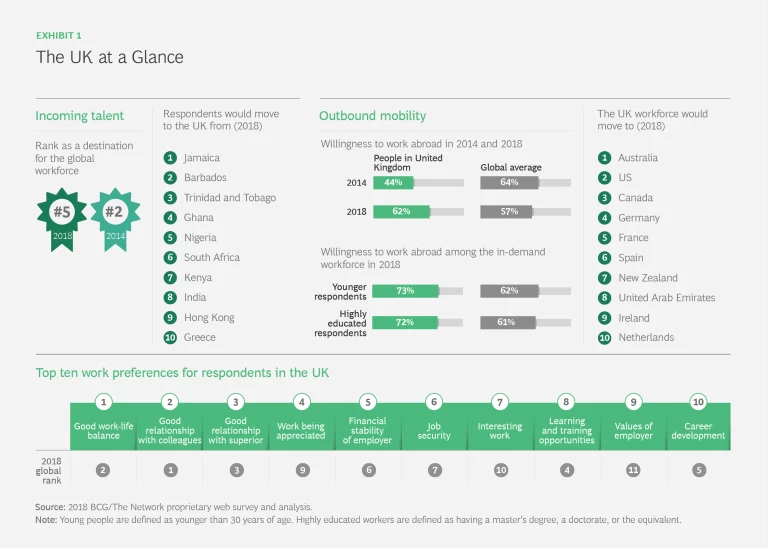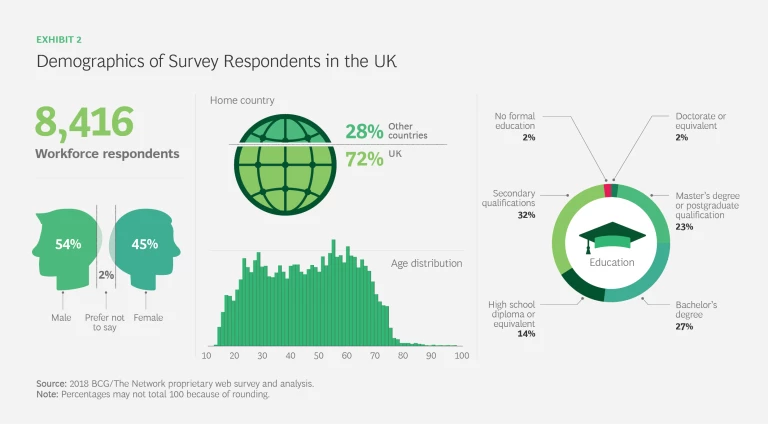This article is part of the series Decoding Global Talent 2018 . The series is based on a survey of 366,000 people in 197 countries by The Boston Consulting Group, The Network, and (in the UK) totaljobs.
B rexit appears to have taken a toll on the UK’s reputation as one of the world’s most desirable places to work.
Four years ago, the UK was the second-most-popular destination for people willing to move abroad for work, and the top country in Europe.
Since then, it has fallen to fifth place among the most attractive global work destinations, and Germany has supplanted it as the most appealing spot in Europe, according to a survey by BCG and The Network.
In the wake of the country’s historic 2016 vote to exit the European Union, more UK residents say they would be willing to move abroad for work, most notably younger people and other highly sought-after groups, our survey shows.
Read more about the featured countries
Read more about the featured countries
- The US Is Still the Top Work-Abroad Choice, but Its Pull Is Waning
- Germany Rises to Number Two as a Work Destination
- France Remains a Top Draw but Still Needs More People
- Switzerland’s Appeal Endures Despite a Dip
- Chinese Residents Are Staying Put for Work
- Russia Faces a Talent Conundrum
- Turkey’s Employers Must Capitalize on Ambitious Talent
Fewer People Moving to the UK to Work
International perceptions of the UK, the future status of European citizens in the UK, and the uncertainty of the UK economy could explain the country’s diminished appeal. The decline in the UK’s popularity as a place to work abroad is particularly apparent for residents of European countries such as Poland, Romania, Spain, and Denmark as well as for the United Arab Emirates and China. (See Exhibit 1.) Residents of all those countries previously ranked it as their top choice. Now, however, they view the US, Germany, Canada, or Australia as more attractive than the UK for opportunities to work abroad, according to our survey.
The impact on work-related migration to the UK can already be seen in official data, especially for EU citizens. Although net migration to the UK increased in the year ending in September 2017, 58,000 fewer EU citizens moved to the country for a job or to look for work, resulting in a 45,000-person net decrease in work-related migration, according to the UK’s Office for National Statistics. The number of EU citizens moving to the UK for work-related reasons is the lowest since 2014, the ONS reports.
Linus Kendall exemplifies the changing attitudes toward living and working in the UK. The 33-year-old has dual Swedish and UK citizenship, lived in the UK for three years, and is completing a PhD in computing from Sheffield Hallam University in Sheffield, South Yorkshire. However, Kendall, whom we interviewed, is completing his doctoral research in India, where he and his Indian-born wife have lived on and off for the past eight years, and plans to settle there. He had considered returning to the UK to do postdoc work, but Brexit and current government immigration policies extinguished that interest.
“It has become very clear that the UK is not a long-term option for me and my family,” Kendall says. “Professionally, the fact that the UK might no longer be part of European research collaborations means that it is a less interesting choice for me as an academic. My wife runs her own business, and for her, possibilities in the UK would have been better if Brexit hadn’t happened.”
The UK’s diminished appeal extends to less educated workers, including those who may or may not have finished high school or who did not complete a college degree, a demographic represented in our survey sample. (See Exhibit 2.) That group ranks the UK sixth in attractiveness as a place to work, behind others including fellow European countries Germany and Spain. UK manufacturers report a tightening labor market for factory positions and temporary workers. Other industry sectors, from agriculture to care homes, are experiencing similar challenges.
Although the UK’s overall popularity has dimmed, residents of some countries still find it an extremely attractive choice for relocating for a job. Among the most interested are residents of English-speaking Commonwealth countries such as Jamaica, Barbados, Trinidad and Tobago, Ghana, Nigeria, and South Africa.
What’s more, the UK remains more attractive than the global average to people in some professions, primarily respondents in highly skilled business and management fields. The UK ranks:
- Second in attractiveness for working abroad in the legal field
- Third in media and information as well as marketing and communications
- Fourth in IT and technology, science and research, digitization and analytics, and consulting
London Is Still Number One
The UK may have lost some of its sparkle, but London remains the most popular city to move to for work among respondents worldwide. As the current largest city in the EU, a world financial hub, and a major base for finance, business, and culture, London has long attracted diverse people and cultures, including immigrants who move there for work.
London’s population is 37% foreign born, and 60% of its residents voted to stay in the EU, both factors that could explain why it is still viewed as a global city with opportunities for foreigners, regardless of their nationality. The city has burnished that image with initiatives such as the #LondonIsOpen campaign, launched after the Brexit vote to show visitors that it remains “entrepreneurial, international and full of creativity and possibility.” The city’s continued popularity in spite of the UK’s diminished stature suggests that cities have a different and, in some cases, stronger brand than the country they are in.
London is still the most popular city to move to for work among respondents worldwide.
James Swanston, 41, relocated to London in 2007 because he believed the city offered more opportunities than those available back home in Australia. Swanston, an Australian army veteran, now has permanent residency in the UK. He used his military experience to launch an inbound-logistics-management firm four years ago that has grown to 20 employees. All but one lives outside the UK—in Serbia, the US, and Australia—either to be near customers or to take advantage of a lower cost of living.
We interviewed Swanston, who says that even though it means he travels constantly to visit employees and clients, he would not dream of living anywhere but London. “It is an amazing city,” he says. “It’s a very vibrant cultural center. There’s a lot of political stability despite what you read in the news. It’s got strong transportation and a good health care system, and education is excellent. Geographically, it’s easy to go from here to Europe and the East Coast of the US.
“London will always be one of those great cities that people will be happy to move to from other parts of the world.”
More UK Residents Willing to Work Abroad
The Brexit referendum could also explain why more than six in ten (62%) UK respondents to our survey are open to working abroad. While that number is only slightly higher than the 57% global average, it’s a substantial increase from 2014, when 44% of UK survey respondents were interested in working abroad. The change represents the biggest percentage increase, by country, in people willing to move abroad for work in the world.Even more UK residents who are younger than age 30 or have advanced degrees would move out of the country for work. For both groups, 73% say they would leave for a job elsewhere, according to the survey.
Respondents’ top reasons for moving abroad are both personal (to gain experience and a chance to live in a different culture, for instance) and professional (including taking advantage of a better career opportunity).
Among survey respondents, Australia replaced the US as UK residents’ favored destination for working abroad, a possible outcome of the instability associated with the US amid the major political shift there. Canada and Germany are also popular overseas job destinations for UK residents.
Making the UK More Attractive to Mobile Talent
Two trends—the decline in the UK’s popularity as a place to move to for work and the increased willingness of UK residents to move abroad for a job—pose risks to the country’s existing talent pool. Both could make recruiting and retaining employees more difficult. It is especially troublesome given that some of the UK residents who are the most willing to move abroad for work are the most desirable, namely younger employees and people with advanced degrees.
The public and private sectors must take steps to reverse the UK’s falling attractiveness.
The public sector must promote policies that enable immigrants working in the UK to continue contributing positively to the country’s economy. Messaging about immigration needs to reassure UK residents and people around the globe that opportunities are available to them and that their contributions are appreciated. In a positive step in this direction, the UK home secretary, Sajid Javid, announced in June 2018 that the country will review its Tier 2 visa system for highly skilled professionals, including foreign doctors. In addition, London should continue to protect its distinct brand as the top work destination and to advertise that it is a global, open, tolerant, and welcoming city.
For their part, companies could improve recruiting and retention by providing job characteristics that respondents find important. According to our survey, people in the UK stay in positions where they are doing meaningful work, where they feel appreciated, and when they can work in a positive environment that provides both a professional challenge and personal support from colleagues and line managers. The reasons why UK residents leave a job are also familiar, including problems with how they are led and managed, negative work environments, and a lack of opportunities to develop and advance. UK companies are facing an increasingly challenging environment in which to attract and keep strong, talented people. They need to focus on understanding job preferences and getting them right.











